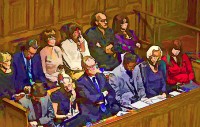
Barral v. State (Nev. Supreme Ct. – July 23, 2015)
The issue is whether a district court commits structural error when it fails to administer an oath to the jury panel, pursuant to NRS 16.030(5), prior to commencing voir dire.
Barral was charged with sexually assaulting a child. His case proceeded to a jury trial. At the beginning of voir dire, both the prosecution and defense explained to the potential jurors the importance of answering their questions honestly. After questioning the first potential juror, the following bench conference took place:
MR. BECKER [for Barral]: My recollection may not be correct, but I think it’s possible that the panel was not sworn in.
THE COURT: They aren’t.
MR BECKER: Okay.
THE COURT: I don’t swear them in until the end.
MR. BECKER: Okay. In other words, admonish [the jury] that they are to give truthful answers to all the questions—
MS. FLECK [for the State]: Yeah[.]
MR. CASTILLO [for Barral]: That’s fine.
….
THE COURT: —I won’t swear them in.
MR. BECKER: Okay.
THE COURT: Because the ones who are sworn in; that’s the panel.
MR. BECKER: Right.
….
MS. FLECK: But do we have to give them the oath that they have to tell the truth[?]
THE COURT: No.
MS. FLECK: Or no?
THE COURT: No.
MS. FLECK: Okay.
THE COURT: No.
MS FLECK: Okay.
The court then proceeded with voir dire. The district court clerk swore in the petit jury at the beginning of the second day of trial. After both parties rested and presented closing arguments, the jury deliberated for approximately three hours and returned guilty verdicts on both charges. Following a post-trial motion for acquittal that the court denied, Barral appealed.
Barral claimed that the district court committed structural error requiring reversal when it failed to comply with NRS 16.030(5) and administer the oath to the jury venire before voir dire. He argued that the court’s error compromised his right to trial by an impartial jury because potential jurors may not have felt obligated to respond truthfully during voir dire, as the court did not place them under oath. The State contended that the potential jurors understood that they were required to answer truthfully because the court and counsel for both sides repeatedly stressed to the venire the importance of answering their questions honestly. The State also argued that the court’s error did not undermine the framework of the trial.
The Nevada Supreme Court noted that although NRS 16.030(5) is articulated in the civil practice section of the Nevada Revised Statutes, it applies to criminal proceedings through NRS 175.021(1). The Court explained that NRS 16.030(5) does not give the district courts discretion: “the judge or the judge’s clerk shall administer an oath or affirmation.” Thus, the Court concluded that the district court violated NRS 16.030(5) in the instant case when, according to its apparent general preference, it failed to administer the oath to the venire. Neither party disputed that the district court erred by violating NRS 16.030(5). However, a district court’s error will not always entitle a convicted defendant to a new trial. The type of relief, if any, to which a criminal defendant is entitled following a trial court’s violation of NRS 16.030(5) was an issue of first impression for the Court.
The Court explained that the United States Supreme Court has repeatedly held that trial court errors which violate a defendant’s Sixth Amendment right to an impartial jury are structural errors that create the probability of prejudice and preclude the need for showing actual prejudice to warrant relief. See Peters v. Kiff, 407 U.S. 493 (1972).
The Peters court considered whether the arbitrary exclusion of African Americans from the grand jury invalidated the indictment and subsequent conviction of a Caucasian criminal defendant. Peters claimed that (1) the juries that indicted and convicted him were created through constitutional and statutorily prohibited means, (2) the consequence of this error on a single prosecution is indeterminable, and (3) any indictment or conviction returned by a jury selected in violation of the Constitution or federal law must be reversed. The U.S. Supreme Court agreed with Peters and concluded that neither the indictment nor the conviction against him was valid due to illegal selection procedures used to seat the grand and petit juries.
The Court noted that the Peters court was specifically concerned with protecting the integrity of the jury selection process through procedural safeguards. The U.S. Supreme Court explained that our system of justice has always endeavored to prevent even the probability of unfairness. The U.S. Supreme Court further clarified that it is in the nature of the practices here challenged that proof of actual harm, or lack of harm, is virtually impossible to adduce, because there is no way to determine the composition of the jury or the decision it would have rendered if the jury had been selected pursuant to constitutional mandates.
Based on the U.S. Supreme Court’s reasoning, the Nevada Supreme Court was persuaded that a defendant in a criminal case is denied due process whenever jury selection procedures do not strictly comport with the laws intended to preserve the integrity of the judicial process. An indictment or a conviction resulting from an improperly selected jury must be reversed. The Court explained that a fair tribunal is an elementary prerequisite to due process, so it will not condone any deviation from constitutionally or statutorily prescribed procedures for jury selection. Accordingly, the Court held that a district court commits structural error when it fails to administer the oath to potential jurors pursuant to NRS 16.030(5). As the Court had concluded that failing to swear the potential jurors is a structural error, it is reversible per se; a defendant need not prove prejudice to obtain relief. Therefore, the Court reversed Barral’s convictions for sexual assault of a minor under 14 years of age and remanded the matter to the district court for a new trial.
Visit the Nevada Appellate Report for more legal news.
